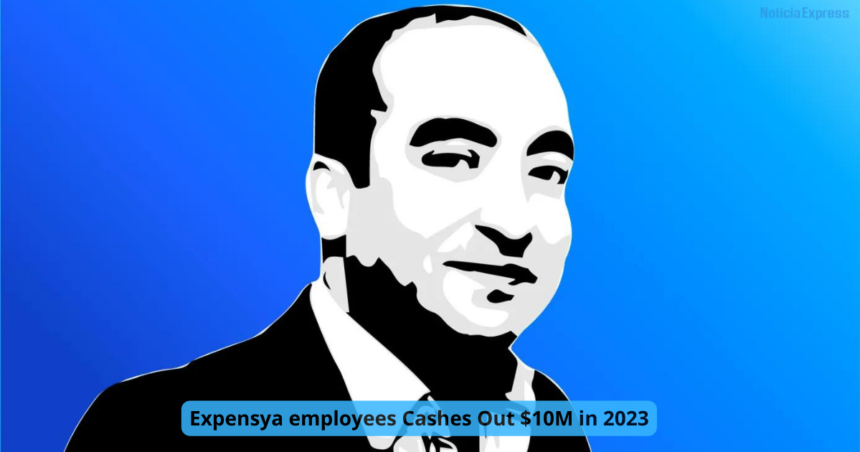Local tech startups are able to accomplish full-cycle events that have global benefits for stakeholders.
that, as an angel investor in a startup, offers greater rewards than paper returns? a purchase that keeps stock in the business while converting those paper returns into a cash dividend. “After dilution, the return was eight times my investment,” Selma Ribica stated recently in an interview. “While I did retain some shares in the new company, the vast majority was in cash.
Expensya’s Global Impact: African Tech Startups Go International
At First Circle Capital, a venture capital firm that specializes in fintech SaaS—or fintech 2.0, as she calls it—Rbica is the general partner at the moment. Her angel investment was in Expensya, a Parisian and Tunisian business focused on spending management. According to people familiar with the transaction, Medius, a private equity group, bought Expensya last June for a price over $100 million.
That sum has only been paid for the acquisition of a small number of African or Africa-focused software companies: InstaDeep by BioNTech, Sendwave by WorldRemit, DPO Group by Network International, and Paystack by Stripe. Similar to InstaDeep, the Expensya acquisition highlights the possibility for goods originating in Africa to cater to international markets and then be acquired by larger corporations.
Africa joined the venture capital bandwagon late, but it was still a bull market for years until the asset class began to decline in the second half of 2022. Before the financial crisis, African companies were primarily encouraged by local investors to concentrate on developing solutions for the continent, with the assurance that funding would follow. Developing international products was frequently an afterthought, especially since local solutions—particularly fintechs—showed exit potential by focusing just on continental markets.
But in the past 18 months, there has been a noticeable change in this story. African companies increasingly face uncontrollable headwinds and macroeconomic obstacles as they work to create solutions for local problems. The most significant tech hubs on the continent, Nigeria, Kenya, and Egypt, are currently experiencing problems with currency devaluation. As a result, revenue growth for startups operating in these markets is either stagnant or slower in dollars, which lowers their valuations in the eyes of international investors.
As a result, investors are increasingly pushing businesses to look at ways to protect their earnings, which is reviving conversations about how crucial it is for local entrepreneurs to have an international perspective when creating their products. For pioneers such as Expensya’s founder and CEO, Karim Jouini, that mentality was essential from the start.
“For numerous reasons, adopting a worldwide focus was practically from the start. Tunisia is a relatively small market that isn’t integrated sufficiently with its neighbors, regardless of what kind of business you are establishing,” Jouini said in a TechCrunch interview. The nation’s companies aren’t necessarily developed enough to be engaged in expenditure management, and its income level is average. Their organizations are still configuring the initial ERP or CRM. Therefore, from the outset, we considered developing a product for markets where businesses are established and have reached the point where they are considering employee productivity and cost control.
To Europe from Tunis
Expensya is a company that was founded in 2014 by Jouini and CTO Jihed Othmani. Its automated expense management solutions are specifically designed for enterprises in Europe. Its software enables companies to implement autonomous spending within predefined rules and limits, optimizing time and simplifying employee expense processes. When integrated with ERP applications, Expensya helps finance teams to oversee and track business expenditures and facilitate streamlined staff reimbursement procedures.
The CEO’s network and more than ten years of experience working with Parrot, Musiwave, and Microsoft were leveraged by the spend management firm, which was initially launched in France and is intended to assist businesses of all sizes in automating their professional spending. Expensya’s initial clientele comprised of approximately 1,000 to 10,000 employees operating in multiple European countries. Consequently, the startup promptly modified its product to operate in these other countries, taking care of local taxes and certifications along the way. This helped to accelerate the company’s expansion into Spain and Germany.
And even if being close to Europe seemed advantageous, there were drawbacks to being a Tunisian startup. First, one of the biggest challenges was navigating the European market, which is somewhat shielded from outside competition by regulations like GDPR. The firm needed to sell to big businesses, so it had to develop strong local sales and marketing teams in order to comply with GDPR regulations. To meet this need, it established teams in France, Spain, and Germany, where it now competes with Concur, Nautilus, and N2F.
When employing a product developed by an African startup, these big consumers occasionally shown some reluctance. They wanted to know if our quality could meet their needs or if it could compete with that of European or American goods, Jouini continued. Thus, we made significant investments to have the greatest offering in the area. We are the best-rated company in the market compared to our European competitors if you look at public ratings of similar products on the App Store or Google Play. This is because we prioritize ensuring that quality is never a concern because doing so would return us to the days of being an African startup, where standards may be lower.
Establishing and sustaining a high-quality product frequently depends on the skill pool of a startup. While Tunisia and Africa are home to a large number of young, gifted people, notably in the engineering and other technological sectors, Jouini noted that Expensya had challenges as it grew due to a lack of experienced managers and leaders and the absence of successful SaaS companies in the region.
The availability of experienced talent in Africa has generally decreased due to emigration since many talented people have chosen to pursue chances in Europe or the United States. These elements make it difficult for African companies to compete on a global scale.
A segment of a worldwide triumph tale
However, there are two sides to talent positioning. Expensya profited from lower operating expenses than comparable enterprises operating in Europe, despite the skills scarcity. Furthermore, Expensya might draw top talent in Tunisia because of its reputation as one of the nation’s well-funded and resourced startups. This is especially true if businesses in Paris found it difficult to draw in the top 5% of talent because of fierce competition from tech giants like Google and Microsoft in their local markets.
Jouini also highlights the fact that, although Expensya, a SaaS firm based in Paris but originally from Tunisia, was seen as simply another among many in Europe, its staff and early backers thought they were part of something special in Africa and were optimistic about the company’s future.
“After working here for a while, our people become involved in more than just their jobs and pay. He remarked, “It’s the sense of accomplishing something significant. It truly makes a difference. “It’s a sentiment that, at least in the countries I know, isn’t discussed enough: people in Africa are eager to contribute to a global success story.”
That mutual hope that existed between workers and investors last year materialized.
Expensya was acquired in 2021 after operating for more than eight years and raising approximately $30 million, including a $20 million Series B at a post-money valuation of $83 million. As a result, its employees were able to participate in an experience that is still unattainable for many of their peers in the African tech ecosystem.
At the time of the transaction, 110 of the 190 employees of the company were based in Tunisia. Jouini revealed on the call that these workers, who included former employees who had worked out of Expensya’s Tunis office, totaled 180 stockholders and received $10 million collectively from the acquisition. Two-thirds of this amount, he said, was cash. Some earned between $200,000 and $250,000. Regarding the workers’ cashouts, Jouini—who is currently the chief of product and tech at Medius—said, “It’s not exactly life-changing money, but it’s definitely path-changing.”
With the support of well-known European private equity companies, Medius, a Swedish conglomerate, has been working for years to create a worldwide CFO automation conglomerate. As part of this effort, it has acquired Expensya as well as other businesses in the US, Sweden, and the UK. Medius’s portfolio becomes stronger and more unified when these solutions are integrated. Geographically speaking, even though Expensya, for example, is still a standalone business, it also provides the private equity firm and its affiliates with a wider presence throughout Europe and North America. Expensya claimed that in the two years preceding its acquisition, it had quadrupled its recurring revenue and expanded its clientele to include 6,000 companies and 700,000 active individuals in 100 countries.
Acquisition events such as Expensya and Instadeep are notable because they demonstrate that African businesses are capable of completing a full cycle, benefiting not just employees but also business angels and venture capitalists (some of whom made a 20x return, for example). Even if it is far smaller than Silicon Valley or other developed tech hubs, it is nonetheless a step in the right direction. These players will probably create their own businesses or invest in startups, which will help Africa’s IT sector expand.
Expensya was crafted with great efficiency. The former M-Pesa executive Ribica, who has invested in fintech companies like Qonto and Bamboo, said, “When you look at their return on capital, revenue-to-investment ratio, and employee count, it’s a super-efficient structure that managed to scale to double-digit millions in revenues while keeping a modest valuation compared to similar models in Europe.” In order to prevent African engineers from fleeing their countries in search of employment in Europe and the United States, we should support more African businesses to develop, compete, and generate well-paying jobs domestically where there is a wealth of engineering talent. This is the plan.
Because of slower decision-making and less market maturity, developing locally can be more difficult for enterprise solutions like Expensya than expanding abroad. Jouini counsels entrepreneurs to concentrate on product sales and implement changes as quickly as feasible. “Avoid excessively over-engineering it,” he advises. “The way to make your SaaS product local or global is to sell and close customers and learn from them.” Second, Jouini and Ribica advise founders to place a high value on people and hire both for the short and long term, pooling stock and giving them a sense of ownership as they go.
“Building an enterprise sales machine begins with building the product. It then moves on to stage two, where it is launched with a small number of customers and tweaked, improved, and a Unique Selling Proposition (USP) is developed. Finally, stage three involves building, recruiting, and retaining talent before scaling up,” said Ribica.
Read more:
Musk vs. Zuckerberg: Who is coming out on top?
The U.S. economy is booming. So why are Employers worried?









